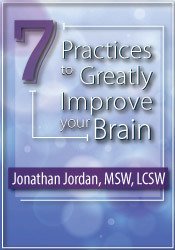

Join neuroscience expert and author, Jonathan Jordan, MSW, LCSW, and discover 7 highly effective brain-based practices to ensure your brain remains healthy and operates with improved memory, reduced feelings of stress, increased cognitive reserve, and overall improved neurological functioning. Drawing on groundbreaking neuroscience research and 29 years of training clients, Mr. Jordan will teach you these simple evidence-based practices that you will be able to immediately apply and teach your clients.
| File type | File name | Number of pages | |
|---|---|---|---|
| Manual (2.7 MB) | 36 Pages | Available after Purchase |
Jonathan Jordan, MSW, LCSW, ACSW, is a renowned licensed psychotherapist and clinical supervisor who has a love for both animals and neuroscience. For decades, he has combined these two loves by incorporating animal-assisted interventions into his brain-based professional practice. Over the years, Jonathan has trained several of his own dogs to be successful therapy animals. Not only does he integrate his therapy dogs into his own practice, Jonathan also works closely with a variety of other medical and mental health professionals to engage his therapy animals in their respective treatment modalities. He has co-developed a unique and evidence-based approach to animal-assisted intervention, the KADRA Model, which engages animals to enhance mindfulness in humans. Jonathan is a long-time member of the prestigious Society for Neuroscience and is a charter member of the Society for Social Neuroscience. Thus, he has extensive knowledge of both human and animal neuroscience research.
Jonathan is an international speaker and author on the topic of animal-assisted interventions motivating others to harness the power of the human-animal bond. He has trained thousands of professionals in his unique synthesis of East-West brain-based practices and AAT. Jonathan is currently writing a book about animal-assisted interventions that explains the incredible range of therapeutic benefits that come from the human-animal emotional bond. He serves as a faculty fellow of Florida State University and was engaged by the United States Senate to deliver brain-based professional development workshops to the entire Senate Staff on Capitol Hill in Washington, DC.
Speaker Disclosures:
Financial: Jonathan Jordan is the President of Global Change Management, Inc. He receives royalties as a published author. Jonathan Jordan receives a speaking honorarium and recording royalties from PESI, Inc. He has no relevant financial relationships with ineligible organizations.
Non-financial: Jonathan Jordan is a member of the National Association of Social Workers and the Society for Social Neuroscience.
Please wait ...